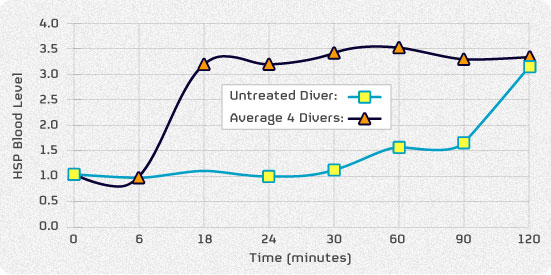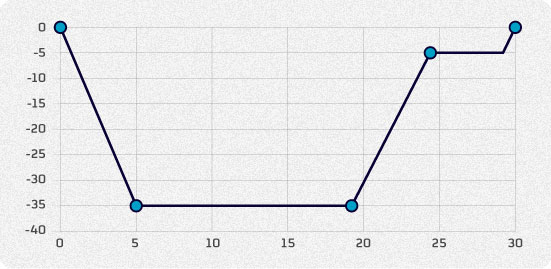Protex-H : Scuba Diving and Stress
: Scuba Diving and Stress
The human body has no immediate response to stress. It can react after a period of time, when the stress damage is already done, by repairing the damaged tissue. Under normal physiological conditions the body is maintained in a state of homeostasis. Under certain aggressive conditions such as intense sport or extreme temperatures, the body feels tired and requires a relatively long period of time to recover from the stress situation. This is the phenomenon of fatigue, a normal mechanism to prevent further damage before the tissues are repaired.
The body is faced with these conditions through the active lifestyles of individuals who participate in extreme sports such as mountaineering, scuba diving, skiing and squash. Particularly significant in terms of such muscle and tissue damage are the compression and decompression, hypoxia and hyperoxia which routinely affect the scuba diver and which can severely limit the amount of diving that can be encompassed on a week’s dive-vacation.
It is important to be aware that the stresses encountered during scuba diving are considered as stress situations every bit as severe as those encountered in the most extreme sports.
Studies, both at sea and in the hyperbaric chamber, have shown that even for what are classified as mild stress dives, such as are carried out in open sea by all recreational divers, blood Heat Shock Protein (HSP) levels took two to three hours to reach useful levels. When the divers took a suitable intake of Protex-H beforehand however, their critical HSP levels rose within 6 minutes of the dive commencing and reached fully effective levels within 18 minutes.
Levels of HSP 72 reached with and without Protex-H

Depth/Time (horizontal) in metres for the study above

The mechanism responsible for protecting and restoring the body, following exposure to extreme conditions, is a group of molecules which are called Heat Shock Proteins (HSPs). These molecules are grouped into families and identified by a number : HSP 27, 70, 72, 90. The number represents the molecular mass of the protein (HSPs). They are also referred to as Chaperonins or Glucose Regulating proteins.
The key role of HSPs is to maintain the structural integrity and specific arrangement of tissues as well as eliminate malformed structures or proteins.
HSPs appear rapidly at elevated levels in the body following stress. They are very efficient at repairing cellular and tissue damage and maintaining the long term integrity of these structures.
Protex-H is a unique, carefully titrated, preparation of an extract of the prickly pear cactus containing the HSP Stimulating Factor Tex-OE® which has the unique ability to prime the stress management system so that it can respond much more rapidly to initial tissue stress damage than in the normal situation. Thus damage is limited and repair much more rapid. Specially developed for professional scuba divers it allows them longer safer work periods and much less muscle fatigue. Now available for the amateur diver it expands the quality of dives and can make a dive holiday much more enjoyable.



